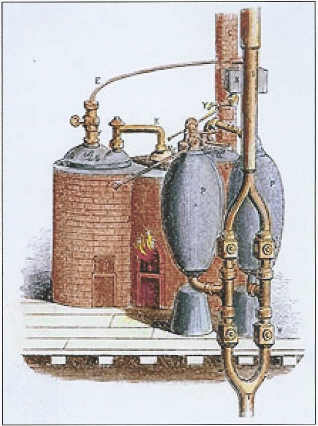|
Athanase Dupré
Louis Victoire Athanase Dupré (28 December 1808 – 10 August 1869) was a French mathematician and physicist noted for his 1860s publications on the mechanical theory of heat (thermodynamics); work that was said to have inspired the publications of engineer François Massieu and his Massieu functions; which in turn inspired the work of American engineer Willard Gibbs Josiah Willard Gibbs (; February 11, 1839 – April 28, 1903) was an American mechanical engineer and scientist who made fundamental theoretical contributions to physics, chemistry, and mathematics. His work on the applications of thermodynami ... and his fundamental equations. See also * Young–Dupré equation References Athanase Dupre Biographyat the MacTutor History of Mathematics archive Thermodynamicists 1869 deaths 1808 births French mathematicians French physicists People from Yonne {{France-mathematician-stub ... [...More Info...] [...Related Items...] OR: [Wikipedia] [Google] [Baidu] |
Athanase Dupre
Athanase is a given name. Notable people with the name include: *Athanase Apartis (1899–1972), Greek sculptor * Athanase Auger (1734–1792), French educator, Hellenist and translator * Athanase Bala (1927–2019), Cameroonian Catholic bishop * Athanase Bassinet (1850–1914), French politician * Athanase Coquerel (other) *Athanase David (1882–1953), Canadian lawyer, politician, and businessman **Prix Athanase-David, annual literary award, part of the Prix du Québec *Athanase Dupré (1808–1869), French mathematician and physicist * Athanase Gaudet (1848–1888), Canadian farmer, merchant and political figure in Quebec *Athanase Josué Coquerel (1820–1875), French Protestant theologian, son of Athanase Laurent Charles Coquerel * Athanase Laurent Charles Coquerel (1795–1868), French Protestant theologian * Athanase Seromba (born 1963), Rwandan priest found guilty of genocide and crimes against humanity committed in the Rwandan genocide * Athanase-Charles-Marie Char ... [...More Info...] [...Related Items...] OR: [Wikipedia] [Google] [Baidu] |
Mechanical Theory Of Heat
The history of thermodynamics is a fundamental strand in the history of physics, the history of chemistry, and the history of science in general. Due to the relevance of thermodynamics in much of science and technology, its history is finely woven with the developments of classical mechanics, quantum mechanics, magnetism, and chemical kinetics, to more distant applied fields such as meteorology, information theory, and biology (physiology), and to technological developments such as the steam engine, internal combustion engine, cryogenics and electricity generation. The development of thermodynamics both drove and was driven by atomic theory. It also, albeit in a subtle manner, motivated new directions in probability and statistics; see, for example, the timeline of thermodynamics. Antiquity The ancients viewed heat as that related to fire. In 3000 BC, the ancient Egyptians viewed heat as related to origin mythologies. The ancient Indian philosophy including ''Vedic philosophy'' ... [...More Info...] [...Related Items...] OR: [Wikipedia] [Google] [Baidu] |
Thermodynamics
Thermodynamics is a branch of physics that deals with heat, Work (thermodynamics), work, and temperature, and their relation to energy, entropy, and the physical properties of matter and radiation. The behavior of these quantities is governed by the four laws of thermodynamics, which convey a quantitative description using measurable macroscopic physical quantity, physical quantities but may be explained in terms of microscopic constituents by statistical mechanics. Thermodynamics applies to various topics in science and engineering, especially physical chemistry, biochemistry, chemical engineering, and mechanical engineering, as well as other complex fields such as meteorology. Historically, thermodynamics developed out of a desire to increase the thermodynamic efficiency, efficiency of early steam engines, particularly through the work of French physicist Nicolas Léonard Sadi Carnot, Sadi Carnot (1824) who believed that engine efficiency was the key that could help France win ... [...More Info...] [...Related Items...] OR: [Wikipedia] [Google] [Baidu] |
François Massieu
François Jacques Dominique Massieu (4 August 1832 – 5 February 1896) was a French thermodynamics engineer noted for his two 1869 characteristic functions, each of which known as a Massieu function (the first of which sometimes called free entropy), as cited by American engineer Willard Gibbs in his 1876 ''On the Equilibrium of Heterogeneous Substances In the history of thermodynamics, "On the Equilibrium of Heterogeneous Substances" is a 300-page paper written by American chemical physicist Willard Gibbs. It is one of the founding papers in thermodynamics, along with German physicist Hermann ...''. References External links *Nivoit, E. (1897). �Notice of the Life and Work of Mr. Massieu Inspector General of Mines” (French → English), Annales des Mines, 9th Series, Vol. 11. {{DEFAULTSORT:Massieu, Francois 1832 births 1896 deaths Thermodynamicists ... [...More Info...] [...Related Items...] OR: [Wikipedia] [Google] [Baidu] |
Massieu Function
In thermodynamics, the Massieu function (sometimes called Massieu–Gibbs function, Massieu potential, or Gibbs function, or characteristic (state) function in its original terminology), symbol ( Psi), is defined by the following relation: : \Psi = \Psi \big( X_1, \dots, X_i, Y_, \dots Y_r \big) \, where for every system with degree of freedom one may choose variables, e.g. \big( X_1, \dots, X_i, Y_, \dots Y_r \big) , to define a coordinate system, where and are extensive and intensive variables, respectively, and where at least one extensive variable must be within this set in order to define the size of the system. The -th variable, , is then called the Massieu function.Inden, Gerhard. (2008). �Introduction to Thermodynamics��, ''Materials Issues for Generation IV Systems'', pgs. 73–112. Springer The Massieu function was introduced in the 1869 paper "On the Characteristic Functions of Various Fluids" by French engineer François Massieu (1832-1896). The ... [...More Info...] [...Related Items...] OR: [Wikipedia] [Google] [Baidu] |
Willard Gibbs
Josiah Willard Gibbs (; February 11, 1839 – April 28, 1903) was an American mechanical engineer and scientist who made fundamental theoretical contributions to physics, chemistry, and mathematics. His work on the applications of thermodynamics was instrumental in transforming physical chemistry into a rigorous deductive science. Together with James Clerk Maxwell and Ludwig Boltzmann, he created statistical mechanics (a term that he coined), explaining the laws of thermodynamics as consequences of the statistical properties of Statistical ensemble (mathematical physics), ensembles of the possible states of a physical system composed of many particles. Gibbs also worked on the application of Maxwell's equations to problems in physical optics. As a mathematician, he created modern vector calculus (independently of the British scientist Oliver Heaviside, who carried out similar work during the same period) and described the Gibbs phenomenon in the theory of Fourier analysis. In ... [...More Info...] [...Related Items...] OR: [Wikipedia] [Google] [Baidu] |
Fundamental Equation
In mathematics, a fundamental theorem is a theorem which is considered to be central and conceptually important for some topic. For example, the fundamental theorem of calculus gives the relationship between differential calculus and integral calculus. The names are mostly traditional, so that for example the fundamental theorem of arithmetic is basic to what would now be called number theory. Some of these are classification theorems of objects which are mainly dealt with in the field. For instance, the fundamental theorem of curves describes classification of regular curves in space up to translation and rotation. Likewise, the mathematical literature sometimes refers to the fundamental lemma of a field. The term lemma is conventionally used to denote a proven proposition which is used as a stepping stone to a larger result, rather than as a useful statement in-and-of itself. Fundamental theorems of mathematical topics * Fundamental theorem of algebra * Fundamental theorem of ... [...More Info...] [...Related Items...] OR: [Wikipedia] [Google] [Baidu] |
Wetting
Wetting is the ability of a liquid to displace gas to maintain contact with a solid surface, resulting from intermolecular interactions when the two are brought together. These interactions occur in the presence of either a gaseous phase or another liquid phase not miscible with the wetting liquid. The degree of wetting (wettability) is determined by a force balance between adhesive and cohesive forces. There are two types of wetting: non-reactive wetting and reactive wetting. Wetting is important in the bonding or adherence of two materials. The wetting power of a liquid, and surface forces which control wetting, are also responsible for related effects, including capillary effects. Surfactants can be used to increase the wetting power of liquids such as water. Wetting has gained increasing attention in nanotechnology and nanoscience research, following the development of nanomaterials over the past two decades (i.e., graphene, carbon nanotube, boron nitride nanomesh). ... [...More Info...] [...Related Items...] OR: [Wikipedia] [Google] [Baidu] |
1869 Deaths
Events January * January 3 – Abdur Rahman Khan is defeated at Tinah Khan, and exiled from Afghanistan. * January 5 – Scotland's second oldest professional football team, Kilmarnock F.C., is founded. * January 20 – Elizabeth Cady Stanton is the first woman to testify before the United States Congress. * January 21 – The P.E.O. Sisterhood, a philanthropic educational organization for women, is founded at Iowa Wesleyan College in Mount Pleasant, Iowa. * January 27 – The Republic of Ezo is proclaimed on the northern Japanese island of Ezo (which will be renamed Hokkaidō on September 20) by remaining adherents to the Tokugawa shogunate. February * February 5 – Prospectors in Moliagul, Victoria, Australia, discover the largest alluvial gold nugget ever found, known as the "Welcome Stranger". * February 20 – Ranavalona II, the Merina Queen of Madagascar, is baptized. * February 25 – The Iron and Steel Institute is formed in Lo ... [...More Info...] [...Related Items...] OR: [Wikipedia] [Google] [Baidu] |
1808 Births
Events January–March * January 1 ** The importation of slaves into the United States is formally banned, as the 1807 Act Prohibiting Importation of Slaves takes effect. However Americans still continue the slave trade by transporting Africans to Cuba and Brazil.. ** Sierra Leone becomes a British Crown Colony. * January 22 – Transfer of the Portuguese court to Brazil: John (Dom João), Prince Regent, and the Braganza royal family of Portugal arrive in their colony of Brazil in exile from the French occupation of their home kingdom. * January 26 – Rum Rebellion: On the 20th anniversary of the foundation of the colony of New South Wales, disgruntled military officers of the New South Wales Corps (the "Rum Corps") overthrow and imprison Governor William Bligh and seize control of the colony. * February 2 – French troops take Rome as part of the Napoleonic Wars. * February 6 – The ship '' Topaz'' (from Boston April 5, 1807, hunting seals) ... [...More Info...] [...Related Items...] OR: [Wikipedia] [Google] [Baidu] |






